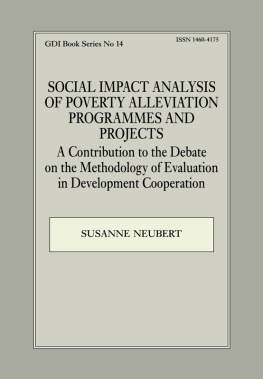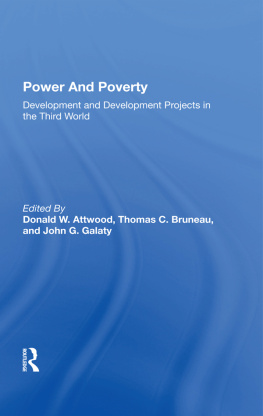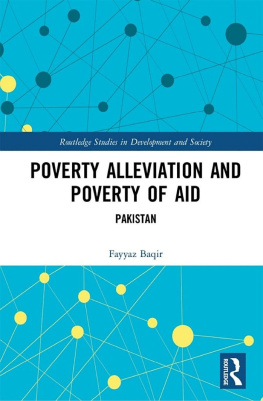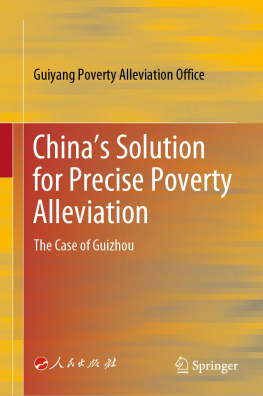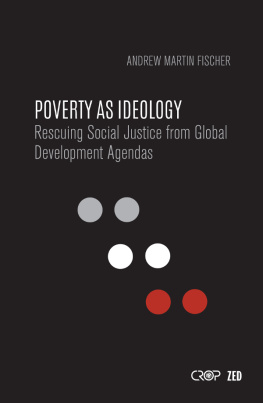Social Impact Analysis
of Poverty Alleviation Programmes
and Projects
SOCIAL IMPACT ANALYSIS OF POVERTY ALLEVIATION PROGRAMMES AND PROJECTS
A Contribution to the Debate on the Methodology of Evaluation in Development Cooperation
SUSANNE NEUBERT
First published in 2000 in Great Britain by
Routledge
2 Park Square, Milton Park, Abingdon, Oxon, 0X14 4RN
270 Madison Ave, New York NY 10016
Transferred to Digital Printing 2010
Website: www.Routledge.com
Copyright 2000 GDI/Frank Cass
British Library Cataloguing in Publication Data
Neubert, Susanne
Social impact analysis of poverty alleviation programmes
and projects : a contribution to the debate on the
methodology of evaluation in development cooperation.
(GDI book series ; no. 14)
1. Poverty Prevention Research 2. Evaluation research
(Social action programs)
I. Title
362.5'8'072
ISBN 0-7146-5049-8 (cased)
ISBN 0-7146-8151-2 (paper)
Library of Congress Cataloging-in-Publication Data
Neubert, Susanne, 1958
Social impact analysis of poverty alleviation programmes and projects : a contribution
to the debate on the methodology of evaluation in development cooperation / Susanne Neubert.
p. cm. (GDI book series, ISSN 1460-4175 : no. 14)
Includes bibliographical references.
ISBN 0-7146-5049-8 (cased). ISBN 0-7146-8151-2 (paper)
1. Economic assistance, DomesticSocial aspects. 2. Economic development projects.
I. Title. II. Series.
HC79.P63 N48 2000
362.5'8-dc21 00-022704
All rights reserved. No part of this publication may be reproduced, stored in or introduced into a retrieval system or transmitted in any form or by any means, electronic, mechanical, photocopying, recording or otherwise, without the prior written permission of the publisher of this book.
Publisher's Note
The publisher has gone to great lengths to ensure the quality of this reprint but points out that some imperfections in the original may be apparent.
Preface
The method of impact assessment of poverty alleviation projects (MAPP) elaborated and presented in this study demonstrates a new way of operationalizing social development at programme level and of evaluating the effectiveness of development programmes and projects in the context of the lives of the target groups. The new method was devised during a debate with German development cooperation institutions, such as the Federal German Ministry for Economic Cooperation and Development (BMZ) and donor organizations, and with counterpart organizations and target groups. The emphasis was placed on the development of a standardized and thus replicable procedure for recording the social impact of project and programme operations at an acceptable level of evaluation effort.
This study was carried out at the German Development Institute (GDI) in Berlin. The field research and evaluations of the literature were completed in mid-1998.
I should like to thank everyone who helped me in many different ways as I undertook this study, especially the people of Mali, i.e. the target groups of the Projet de Gestion des Ressources Naturelles (PGRN), who analysed the impact of the project with great commitment. My thanks too to Andreas von Ramdohr, Niko von der Lhe, Eckhard Dudeck and Fatim Haidara, colleagues at the German Agency for Technical Cooperation (GTZ), for their generous support during the evaluation process.
The description of evaluation as it is undertaken in Germany is based on a number of interviews. I am very grateful to the staff of the BMZ, KfW, GTZ, DED, KAS, FES, HBS and EZE for the information they have provided and especially to Volker Steigerwald for his help and criticism as the study emerged. Success in the further development of the methodology of social project evaluation will also continue to depend primarily on the institutions and people I have mentioned.
I also wish to thank the professionals of the German Development Institute for their support and for the discussions we have had.
Berlin, November 1999 Susanne Neubert
Contents
Figures in the text
Tables in the text
Abbreviations
| ADB | Asian Development Bank |
| AEA | Agro-ecosystems Analysis |
| BA | Beneficiary Assessment |
| BMZ | Bundesministrium fr wirtschaftliche Zusammenarbeit und Entwicklung (Federal Ministry for Economic Cooperation and Development) |
| CDG | Carl Duisberg-Gesellschaft (Carl Duisberg Society) |
| CVGRN | Comit Villageois de Gestion des Ressources Naturelles |
| DAC | Development Assistance Committee |
| DED | Deutscher Entwicklungsdienst (German Development Service) |
| DFID | Department for International Development |
| EZE | Evangelische Zentralstelle fr Entwicklungshilfe (Development Aid Centre of the Protestant Church in Germany) |
| FCFA | Franc de la Communaut Financire Africaine |
| FES | Friedrich-Ebert-Stiftung (Friedrich Ebert Foundation) |
| GTZ | Deutsche Gesellschaft fr Technische Zusammenarbeit (German Agency for Technical Cooperation) |
| HBS | Heinrich-Bll-Stiftung (Heinrich Bll Foundation) |
| HDR | Human Development Report |
| HWWA | Hamburger Institut fr Wirtschaftsforschung (Hamburg Institute for Economic Research; formerly Hamburger Weltwirtschaftliches Archiv) |
| IDS | Institute of Development Studies |
| IFAD | International Fund for Agricultural Development |
| IJA | Initiative pour les Jeunes Aveugles |
| KAS | Konrad-Adenauer-Stiftung (Konrad Adenauer Foundation) |
| KfW | Kreditanstalt fr Wiederaufbau (the German Development Bank) |
| M&E | monitoring and evaluation |
| NGO | Non-governmental Organization |
| NRAC | Natural Resources Advisers Conference |
| NRPAD | Natural Resources Policy and Advisory Department |
| ODA | Overseas Development Administration (now DFID) |
| OECD | Organization for Economic Co-operation and Development |
| OED | Operations Evaluation Department |
| PAR | Participatory Action Research |
| PE | Participatory Evaluation |
| PGRN | Projet de Gestion des Ressources Naturelles |
| PIDEB | Programme Intgr de Dveloppement de Bafoulab |
| PPR | Project Progress Review |
| PRA | Participatory Rural Appraisal |
| RA | Regional Assistant |
| RSA | Rapid Social Assessment |
| SRL | Sustainable Rural Livelihood |
| TGA | Target-group Analysis |
| TOR | Terms of Reference |
| UNDP | United Nations Development Programme |
| ZOPP | Zielorientierte Programmplanung (Objectives-oriented Project Planning) |
Summary
Development organizations are busily searching for concepts and methods that will enable impacts of development cooperation to be recorded and scientifically tenable, transparent and practicable conclusions to be drawn. They rightly expect the cost of evaluations to be proportional to the project budget. While a standardized set of tools is available for the economic and technical evaluation of projects, methods of covering the social dimension, which are of prime importance for impact analysis, have yet to reach maturity. This study considers the state of research on evaluation that includes the social dimension and the methods used. A new method of impact assessment of poverty alleviation projects (MAPP) is also presented and underpinned empirically. MAPP is based on a multidimensional conception of poverty and shows how the social dimension can be operationalized with the aid of four key social processes:

